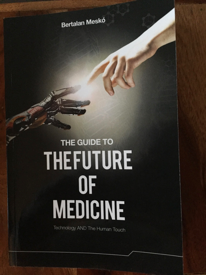I was doing one of my regular scans through LinkedIn sometime last month and came across this challenge from Dr Bertalan Meskó, MD, PhD (Director at The Medical Futurist Institute), who wrote:
“Tell me what healthcare will look like in 2050 and I send a free copy of the brand-new edition of The Guide to the Future of Medicine to the one with the most likes and to the one I liked the most. I cannot wait to hear how you think about the future.”
Alongside 149 other comments (which you can read here), I posted this:
“Nice challenge…here’re my thoughts: I dream about provider organisations (call them ACO’s or whatever they will be called by then) truly creating trust in their local populations and ensuring that their needs and preferences are delivered (with all the cost benefits that arise from this). But this will require these collaboratives to have proper strategies which allocate scare resources in a much clearer and better way. There will no doubt be a lot of ‘self-service’ healthcare but I again dream of more health, and less healthcare. So, these same collaboratives address the many social and economic determinants of health with solid and trusting partnerships. AI – the current buzz word – would’ve developed significantly with MRI scanners reading the radiology reports BUT I am sure that the human element of care and compassion will still be present…. because humanity needs this”.
This brief response was instinctively driven by all the experiences I have had throughout my clinical and commercial careers in healthcare and the beliefs that arose from those experiences. And hey, I won! My copy of the book was duly posted to me in London from Hungary. 
A few weeks later, I was invited by the NHS Partners Network to attend a small and stimulating ‘conversation session’ with Stephen Dorrell, Chair of the NHS Confederation and previous MP and Chair of the Health Select Committee. The first comment he made was that there is a distinct lack of clear vision, referring to the government’s incapacity to present such a vision. I probed more on this during the Q+A and he clarified that by ‘vision’ he was referring to one that went wider than just healthcare, given that the NHS is just part of the public services we all need to stay well and live happier, healthier lives! Snap, with my musings in the LinkedIn post.
These two recent events made me wonder if we are living in a visionary vacuum. I think we are.
There seems to be an ever-widening gap between central, political policy and the coal-face where health and healthcare happens. We seem to have loads of sight, i.e.:
- Experts on leadership and change management
- Analysts who make sense of the complex policy and regulatory landscape
- Forecasters who predict (or try to predict) future events; and given the time of year we’re bracing for the usual New Year onslaught on this front!
- “Visions” articulated by individual organisations within the health ecosystem
But there is no collective vision that goes beyond that of one Trust, one pharma company, or one tech start-up.
Vision is about people, not programmes, projects or profits
What if Martin Luther King had not said “I have a dream” but rather “I have a strategic plan”?
Vision is about aspiration, hope and optimism. It’s about seeing the future and translating that into something that we can all understand and want to follow. Visionaries are inclusive and invite others to become part of their vision.
Let’s do something about that…
Here’s a call to any visionaries out there. Please make contact and join me in this quest to create, lead, push forward and stimulate a vision for health and healthcare that we can all believe in and share. I’d be happy to host a breakfast session for us to get together.
“The only thing worse than being blind is having sight but no vision” – Helen Keller
Thank you for reading this post.
This has been ‘Away from the Heard’: The Saffron Steer blog. We’d be very interested to hear any views and comments that it might have inspired.

